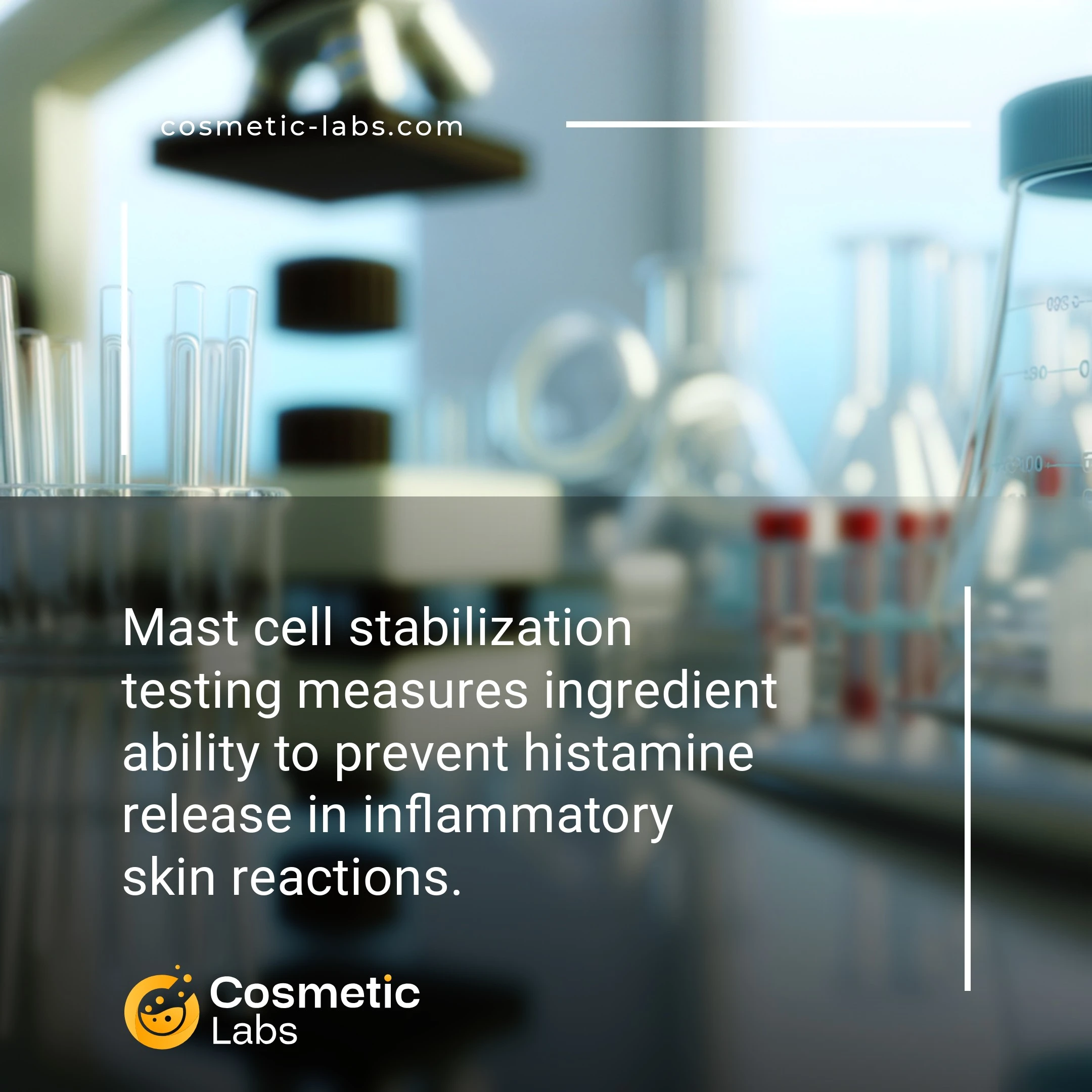Mast Cell Stabilization Testing for Anti-Inflammatory Cosmetics

What is Mast cell stabilization?
Mast cell stabilization testing is a preclinical assay that measures how cosmetic ingredients prevent mast cells from releasing inflammatory mediators like histamine and cytokines. Labs use human mast cell lines or primary cells exposed to allergens or irritants, then test whether your formulation blocks degranulation—the process where mast cells dump their inflammatory contents. This testing reveals if your anti-aging serum or sensitive skin cream can actually calm inflammation at the cellular level, not just reduce visible redness.
Why do you need this service?
Cosmetic labs use mast cell stabilization assays to validate anti-inflammatory claims for sensitive skin formulations, testing ingredients like quercetin, cromoglicic acid, and botanical extracts before product launch. These protocols help brands demonstrate reduced histamine release and inflammatory mediator activity in regulatory submissions, supporting marketing claims for rosacea treatments, anti-aging serums, and barrier repair products targeting reactive skin conditions.
Who provides Mast cell stabilization services?
All cosmetic labs providing Mast cell stabilization services
There is no company providing these services at the moment.
Mast Cell Stabilization Testing for Anti-Inflammatory Cosmetics
Mast cell stabilization testing validates your cosmetic formulations’ ability to prevent inflammatory cascades before they start. This specialized assay measures how effectively your ingredients block mast cell degranulation, offering concrete data on anti-inflammatory potential for sensitive skin products.
Laboratory Testing Protocols
Labs use degranulation assays to measure mast cell activation in response to allergens and irritants. The process involves exposing cultured mast cells to your test compounds, then measuring histamine release and inflammatory mediator production. Results show percentage inhibition compared to positive controls.
Testing typically includes:
- Dose-response curves for active ingredients
- Cytotoxicity screening at multiple concentrations
- Comparative analysis against known stabilizers like cromoglycate
- Time-course studies for onset and duration of effects
Application for Product Development
This testing proves particularly valuable for sensitive skin formulations, anti-aging products, and cosmetics targeting rosacea or atopic dermatitis. Data supports marketing claims about soothing properties and helps justify premium pricing for specialized formulations.
Labs can test raw materials, finished products, or specific botanical extracts. Results guide formulation adjustments and provide regulatory documentation for safety assessments. Partner labs on our platform offer standardized protocols with turnaround times of 2-3 weeks for comprehensive mast cell studies.
Practical Applications of Mast Cell Stabilization Testing
Mast cell stabilization testing applications provide brands with concrete data on how formulations control inflammatory responses in sensitive skin conditions.
Anti-Aging Product Development
Labs use mast cell stabilization assays to validate ingredients that prevent collagen degradation triggered by chronic inflammation. Testing protocols measure histamine release inhibition rates, typically showing 30-70% reduction with effective compounds like quercetin or cromoglycate derivatives.
Brands developing serums and creams for mature skin rely on these tests to demonstrate how active ingredients block inflammatory cascades. Results help formulation teams optimize concentrations and select synergistic ingredient combinations that maintain skin barrier integrity.
Sensitive Skin Care Formulation
Cosmetic labs employ mast cell stabilization testing to screen potential irritants and validate soothing ingredients for reactive skin types. Testing identifies formulations that reduce inflammatory mediator release by 40-80% compared to untreated controls.
Product developers use this data to create gentle cleansers, moisturizers, and treatments for rosacea-prone or atopic skin. Testing helps teams avoid ingredients that trigger degranulation while confirming the efficacy of calming botanicals and synthetic anti-inflammatory compounds.
| Test Parameter | Measurement Range | Typical Results |
|---|---|---|
| Histamine Release Inhibition | 0-100% | 30-70% reduction |
| Degranulation Prevention | Visual scoring 0-4 | 2-3 point improvement |
| Inflammatory Mediator Reduction | pg/mL concentration | 40-80% decrease |
Connect with specialized cosmetic labs on our platform to access mast cell stabilization testing services for your product development needs.
